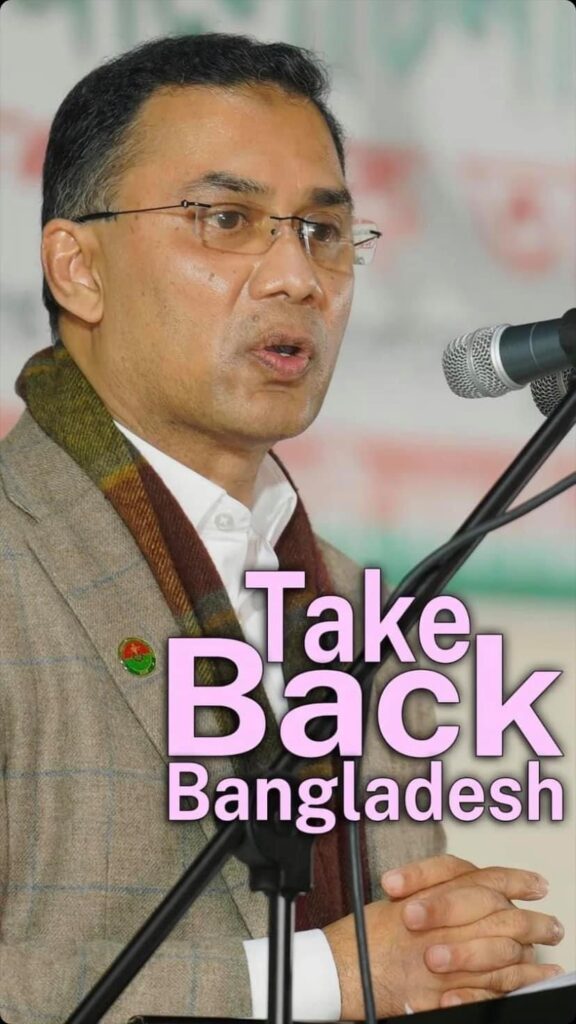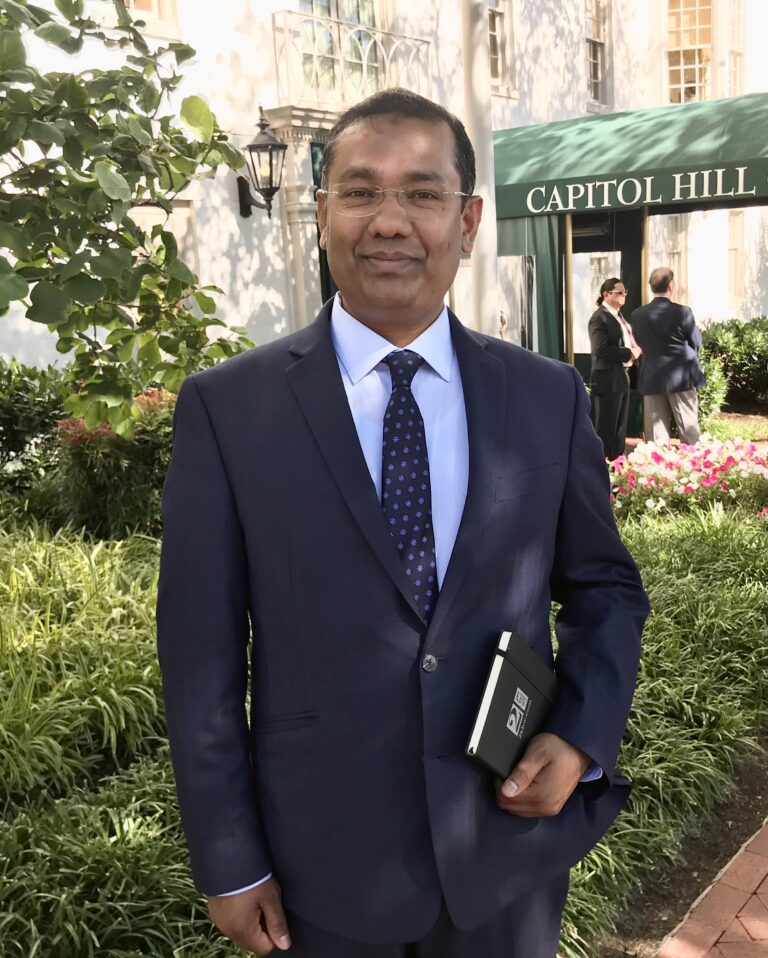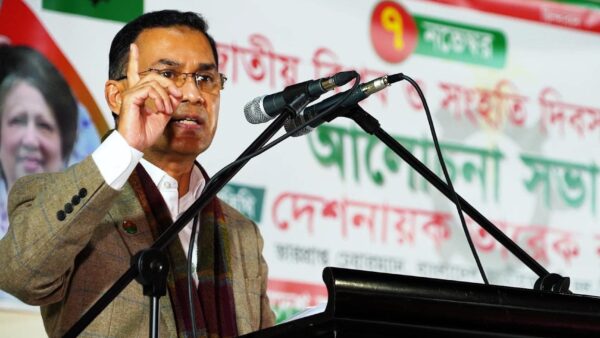Tarique Rahman’s call to his nation is not a bluff or a mere political stunt. The Acting Chairman of the Bangladesh Nationalist Party-BNP is mindful, a lot has changed since Sheikh Hasina was sent to power in 2009. Crippled over a decade, the Bangladeshis are no longer in charge of their own fate. Who else will realize this better than Mr Rahman, a man grown as a grassroots politician in the soil of 170 million people? He knows Bangladesh has endured enough not to suffer more. Any longer wait could mean never returning to the era of hopes and prosperities. No doubt, this intensely drives Mr Rahman to take Bangladesh back from the squatters.

Tarique Rahman born on 20th November 1964 in a powerful family is carrying the blood of a president father and a prime minister mother. He witnessed the historic transition of his country only at seven when his father late Ziaur Rahman (popularly known as Shaheed Zia) declared independence of Bangladesh in 1971. The November revolution of 1975 regaining the sovereignty of the country and turning Zia into a statesman also happened in front of Tarique’s eyes. Then, in the years from 1982 to 1990, he saw his mother Begum Khaleda Zia struggling against an autocrat to restore democracy in the country. My reasoning supports my thought that Tarique Rahman sowed in his heart the concept of grassroots politics at the time. What he had learnt since his childhood was the need for people’s empowerment to secure the independence and sovereignty as well as the development of the country.
As such, a significant part of Tarique Rahman’s life was spent preparing himself to connect to the people who he knew he would lead one day. He, therefore, kept himself away from the power, despite his party’s victory in the general elections of 1991 and 2001. However, while he was rising as a grassroots politician, Bangladesh faced the so-called 1/11 targeting the Zia family and the nationalist force. The obvious goal was to transmute Bangladesh into a failed state. Gradually to date, the people of Bangladesh have lost all their achievements including their true sovereignty. This leaves Mr Rahman with only one choice to call his countrymen to take back Bangladesh.
For those struggling to conceive the geopolitics over the strategic Bay-of-Bengal, I should refer to the recent episode of the fairly long story, dating back to September 2006 when the country faced anarchy at the hands of the Bangladesh Awami League (BAL). To grab power, Sheikh Hasina vowed to disable the country and ordered her followers to march to the capital with fatal weapons Boitha-Logi. Innocent people were seen mercilessly killed in the streets of Dhaka and their dead bodies were assaulted and demeaned by the armed-cadres of the Hasina-led alliance. All this was pre-planned and aided by external elements, opening the door for an army-backed caretaker government to take over the power. The stakeholders’ eventual objective was to transform Bangladesh into a vassal state with Sheikh Hasina as its nominal head. For obvious reasons, the BNP was their sole target. Those conspiring indeed plotted to eliminate Begum Khaleda Zia and Tarique Rahman from the political platform of Bangladesh. Accordingly, both were arrested by the incumbent government and, in September 2008, Mr Rahman was exiled to England.
We must not assume Tarique Rahman’s departure from Bangladesh as an ordinary course of events. From the occurrences both at the time and in the subsequent years, even a lay person will conclude that the perpetrators of 1/11 intended to destabilize Bangladesh. They wanted the country to collapse politically, culturally, economically and constitutionally so that its sovereignty could be compromised. That in mind, they marked Tarique Rahman’s presence in Bangladesh as a deterrent to their agenda. They were acutely frightened of his talent and charisma to glorify a nation, which they became adamant to see not happening. The culprits also foresaw, despite all the propaganda, Mr Rahman’s incredible influence over his followers and the countrymen could not be axed by any other means. Therefore, to avoid a definite uprising against the beneficiaries of the so-called 1/11, they decided to detach Mr Rahman from his motherland where he had grown up both as a human and as a politician.
And a lot has changed since Tarique Rahman departed Bangladesh. Through controversial elections held under the army-backed caretaker government in December 2008, the BAL captured power in 2009 and turned the country into an authoritarian state. Democracy and rule of law have since disappeared from the land. The BAL’s new chapter of governance started with the massive loss of 57 military officers in a purported mutiny that took place in February 2009. The picture of conspiracies against Bangladesh was evident but the truth is still concealed. Subsequently, the farcical general elections of 2014 and 2018 have re-established a one-party rule in Bangladesh that happened once before in 1975 with the creation of the BAKSAL by late Sheikh Mujibur Rahman, father of Sheikh Hasina.
As we find it, the absolute denial by the regime of people’s human rights and fundamental freedoms is an issue expressly and repeatedly acknowledged and addressed by the international community. On 10th December 2021, the US Treasury designated Bangladesh’s Rapid Action Battalion (RAB) for violating human rights and banned its former DG Benazir Ahmed. Along with his, Mr Rahman is also alert of the corruption that has reached its peak during the BAL’s current rule. The Swiss National Bank (SNB) reported in the middle of 2022, TK 82.76 Billion had been deposited by Bangladeshis in various banks in Switzerland at the end of 2021. The Swiss authorities have reaffirmed that Sheikh Hasina’s government has taken no initiative to reclaim the money. It is widely believed that Sheikh Hasina and her close family members are drowned in corruption.
While all the sectors including education, health and environment have totally been destroyed by the current BAL government, what must heavily concern Mr Rahman is the regime’s insensible foreign policy. At present, Bangladesh does not have any true friends internationally. Its historic and trustworthy relationship with the West including the USA and the UK has visibly broken down due to Sheikh Hasina’s undemocratic, oppressive and lunatic behaviors. Her questionable intimacy with some dictators and subservient diplomacy with the neighbor have aggravated this. On a serious note, Sheikh Hasina has contributed towards an imbalanced geopolitics in the South Asian region, undermining the interests of Bangladesh and many other countries including the USA. For the Bangladeshis, she has given in the independence and sovereignty of the country.
That said, I have no doubt, Tarique Rahman has correctly and at the right time called his nation to take back Bangladesh. If his voice is ignored, the very existence of Bangladesh could be at stake. The global community will suffer the consequences too.

Abu Sayem is a barrister and a human rights defender.
Note: This content is not produced by londondailypost and Alex Carry and here is Source Link





























